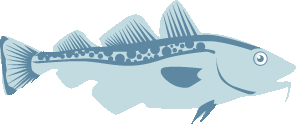Overview
This FIP has been established by the Scottish Fisheries Sustainable Accreditation Group (SFSAG; http://scottishfsag.org/), to support work to rebuild the North Sea cod stock, as well as to improve management of the North Sea whiting stock. SFSAG is an organisation of all the major Producer Organisations in Scotland (and some in England). It is an MSC certificate-holder for several demersal stocks around Scotland (see https://fisheries.msc.org/en/fisheries/sfsag-northern-demersal-stocks/@@view). North Sea cod and whiting are part of this mixed demersal fishery and are assessed under Principle 2 in that certification. As required, the conditions and action plan on these overlapping fisheries are folded into this FIP so that the FIP covers all MSC PIs for the cod and whiting stocks.
North Sea cod is a talismanic stock for Scottish fisheries. It was overfished in the 1980s and 1990s but management was improved, and from ~2005 onwards it appeared to be recovering. However, the most recent stock assessment suggested that recovery had stalled, and also exposed major problems with the assessment. Likewise, for North Sea whiting, the 2018 assessment suggested that stock status was worse than thought, as well as exposing problems with the previous (pre-benchmark) stock assessment.
The scope of the FIP is as follows:
- Target stocks: North Sea cod (Gadus morhua) and North Sea whiting (Merlangius merlangus)
- Fishing gears: All gears used by SFSAG members to target these stocks: i.e. demersal otter trawl (single and twin), Nephrops trawl (single and twin), Danish seine, pair trawl, pair trawl-seine
- Fleet: All vessels belonging to SFSAG member organisations
This FIP has been established by the Scottish Fisheries Sustainable Accreditation Group (SFSAG; http://scottishfsag.org/), to support work to rebuild the North Sea cod stock, as well as to improve manage
- Rebuild the North Sea cod stock above the PRI by 31st March 2024
- Put in place a long-term management plan for North Sea cod, including a management target, harvest strategy and harvest control rules and tools, by 31st March 2024
- Improve the stock assessment for North Sea cod, by 31st March 2023
- Put in place a robust harvest strategy for North Sea whiting, by 31st March 2025
- Ensure that bycatch of starry ray and common skate is not having an impact on the recovery of these stocks, by 31st March 2023
- Ensure that the fishery is not causing serious or irreversible harm to Fladen Ground seapens, by 31st March 2022

